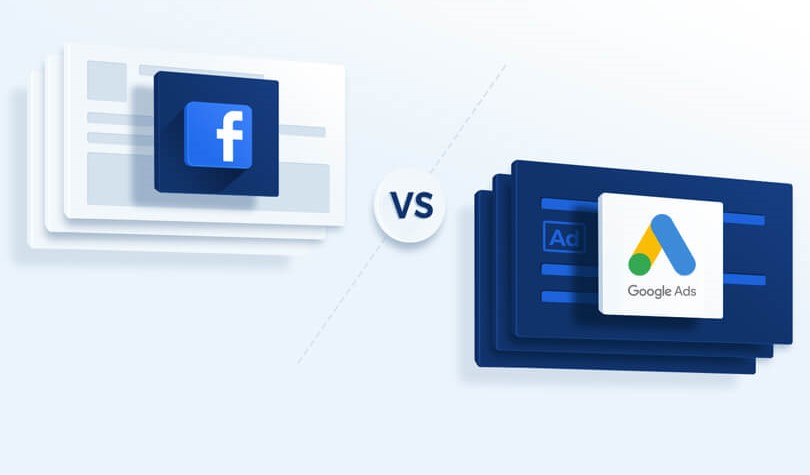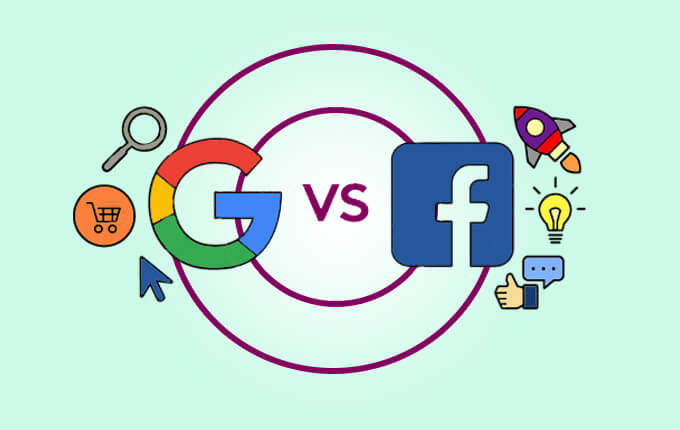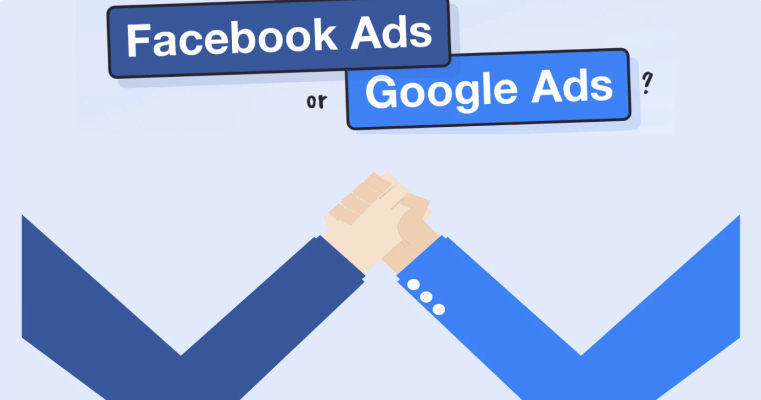The true competitors?
Until recently, many advertisers viewed Google ads and Facebook ads in an adversarial way. Although the two platforms are often positioned as competitors, nothing could be further from the truth in a practical sense.
Many businesses are leveraging the strengths of advertising on Google and Facebook Ads in concert to achieve maximum visibility, increase leads and sales, and find new customers, adopting different strategies that align with the functionality of each platform and seeing remarkable return on their advertising spend.
Google Adwords Advantages
Google Ads, better known as Adwords, is Google’s billion-dollar revenue generator. The ad network allows businesses of any size and individuals to place ads in the search results and on websites in Google’s network (more than 3 million websites and counting).
Ads appear at the top of the Google search results and often at the bottom of each page. These paid ads look similar to organic listings but have an “Ad” icon in green before the copy.
You might think that this labelling of the search results would deter people from clicking. In reality, 60% of people either do not notice the difference between organic results and paid search results, or they simply do not care. Ads on search results page get more clicks than organic results.
To place an advertisement, marketers enter their ad copy into an auction. Google’s algorithm determines where in the paid search results your ad should appear. This is called your Ad Rank.
The factors that determine the position of your ad or your Ad Rank are:
- Your bid (how much you’re willing to pay for a click)
- Your ads click-through-rate or CTR (how often people click your ad compared to the number of times it is displayed)
- The landing page experience (the copy of website page you send people to should match the copy of the ad)
- Your Ad extensions (extra information like phone numbers and calls-to-action)
In summary, if you offer to pay a higher amount for clicks, but your ads are super popular with searchers and your landing page is a hit, you will pay less for clicks.
You can reach 1st place in paid search results even if you spend less on clicks that your competitors in position 2 and 3.
The quality and relevance of your keywords, ad copy, and landing pages are paramount.

The Strengths and Advantages of Facebook Ads
Compared to Google Ads, Facebook Ads (as we know it today) is the scrappy newcomer, but in fact, Facebook has been refining and improving its advertising solution for several years. Today, Facebook Ads is a pioneer in the sphere of paid social and has become a central part of many business’ digital marketing strategies.
Unparalleled Audience Granularity
Similarly to Google, Facebook boasts a truly vast global audience. With more than 1.55 BILLION monthly active users – more than one-fifth of the entire world’s population, and that’s not counting inactive or infrequently used accounts – Facebook has no rival when it comes to the enormity of its audience. However, rather than exposing advertisers and their messaging to this vast audience, the true strength of Facebook’s immense audience lies in the potential granularity with which advertisers can target Facebook’s users.
People share almost every conceivable detail of their lives on Facebook. From meeting and marrying partners to the birth of children or the celebration of new career moves, Facebook’s users share the joys and accomplishments of life’s milestones with their friends and networks every single day.
They also search for and consume content that aligns with a huge range of personal interests, beliefs, ideologies, and values, presenting advertisers with a unique opportunity to tailor advertising messaging to target audiences in ways previously considered impossible, or even unimaginable.
One of the most powerful applications of this functionality is the ability for advertisers to create what are known as “lookalike audiences.” Advertisers can upload customer information from their own databases to Facebook, which then applies filtering based on its own data and information provided by third-party data brokers to match users whose information the advertiser uploads.
This creates the “lookalike” audience of users, allowing advertisers to effectively double the potential reach of their advertisements by targeting new customers who exhibit the same interests and consumer behavior as their existing customers.
Many newcomers to paid social ask the same question, namely “Does Facebook advertising work?” By now, the answer should be clear – yes it does, and remarkably well. However, rather than view Facebook as the world’s largest potential billboard, advertisers should consider Facebook as a way to get closer to their ideal customers than they ever thought possible.
An Inherently Visual Platform
Unlike their comparatively dry, text-based PPC cousins, Facebook ads are powerfully visual. The very best Facebook ads blend in seamlessly with the videos, images, and other visual content in users’ News Feeds, and this enables advertisers to leverage not only the strongly persuasive qualities of visual ads but to do so in a way that conveys the aspirational messaging that makes high-quality ads so compelling.
Just as Google is constantly experimenting with the formatting of its text-based PPC ads, Facebook constantly evaluates how it can offer advertisers a superior marketing platform and users a satisfying, rewarding online experience.
In the past, Facebook mandated that ads on its platform featured text that occupied no more than 20% of the total advertising area, a restriction it has since relaxed. However, despite this considerable change to its advertising governance, Facebook remains an inherently visual platform – a major selling point to many advertisers.
Incredible ROI
Businesses and marketers experimenting with Facebook Ads are often impressed by the granularity of its targeting options, as well as the tools they have at their disposal for creating beautiful, engaging ads. However, one element of Facebook Ads that consistently takes newcomers by surprise is the potential return on investment that advertising on Facebook offers, and how far savvy advertisers can stretch a limited ad budget on the platform.

The Final Face-off: Facebook Ads vs Google Ads
Now that you are armed with some knowledge on Facebook Ads vs Google Ads, which one should you choose? Both are great options and provide your business with ample opportunity for growth.
If you are looking to get more sales, to generate leads, or to book appointments with your business, both platforms are excellent choices. Google has a slight advantage however due to the intent of the customer.
If your goal is to increase brand awareness, Facebook and social media is the clear king.
In a perfect world, you would utilize both together to create a highly effective marketing campaign. Both will help drive more traffic and interest to your business, and both allow you to retarget customers to increase conversion rates.
Now that you understand which platform is best for you, we highly recommend you spend some time getting familiar with how to build a successful marketing campaign on each platform, how to maximize your return on investment, and how to operate each platform.

It’s all about what you’re trying to achieve
Harnessing the power of both paid search and paid social is a remarkably effective advertising strategy. However, it necessitates a dual advertising strategy that aligns with the strengths of each respective platform.
Although marketing messaging can – and arguably should – remain consistent across both Google and Facebook Ads, it’s vital to understand how best to use each platform for maximum ROI and greater business growth.
You can also reach out to our team for assistance with running your online marketing campaigns. We take the headache away and ensure you minimize your wasted ad spend.
